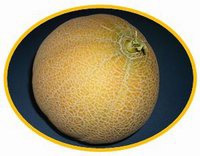 In recent years, considering the large consumption of both whole and fresh-cut melon alone or in mixed fruit salads, melon is identified as a vehicle for pathogens, such as Listeria monocytogenes and Salmonella Typhimurium, thus it is considered the cause of many foodborne illnesses.
In recent years, considering the large consumption of both whole and fresh-cut melon alone or in mixed fruit salads, melon is identified as a vehicle for pathogens, such as Listeria monocytogenes and Salmonella Typhimurium, thus it is considered the cause of many foodborne illnesses.Many sanitation treatments have been tested without obtaining a satisfactory abatement of microbial load. Moreover, melon rind netting favours microorganisms growth and reduces the efficacy of sanitizers.
U.S. scientists have developed a commercial thermal process based on melon rind pasteurization to improve microbial safety.
For the study, whole melons were artificially inoculated with Salmonella Poona RM 2350 and stored at 32°C for 24 h before a thermal process to simulate field conditions.The thermal process consisted in the immersion of a whole melon in hot water at 82°C and 92°C for 60 or 90 sec. After the thermal process, the whole melons were stored at 4°C for 9 days.
Results showed that the thermal process at 92°C for 60 or 90 sec reduced Salmonella Poona population in excess of 5 log CFU/g. Furthermore, thermal treated whole melons and fresh-cut melons prepared from thermal treated melons preserved the flesh firmness and the levels of Salmonella resulted as undetectable (See Tables).
Residual population of Salmonella Poona RM 2350 on rind of treated and nontreated artificially inoculated cantaloupes that were stored at 4°C for up to 9 days. Click here to enlarge the table.

Residual population of Salmonella Poona RM 2350 on fresh-cut cantaloupe prepared from artificially inoculated melons and stored for up to 9 days at 4°C after pilot-scale surface pasteurization treatment. Click here to enlarge the table

The study has demonstrated that the melon rind pasteurization at 92°C for 90 sec will improve the microbial safety and will extend the shelf-life of both whole and fresh-cut melon. Furthermore, the pasteurization for 90 sec or less time satisfies the current commercial requirements of the whole-melon packaging industry.
Source: Annous B.A., Burke, A., Sites J.E., Phillips J.G., ‘Commercial thermal process for inactivating Salmonella Poona on surfaces of whole fresh Cantaloupes’, 2013, Journal of Food Protection, Vol. 76(3), pagg. 420-428.
Further info: http://www.ingentaconnect.com/content/iafp/jfp/2013/00000076/00000003/art00006?crawler=true
